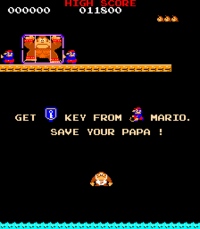Donkey Kong Jr. (game): Difference between revisions
m (Robot: Automated text replacement (-''Mario'' series +''Mario'' franchise)) |
No edit summary |
||
| Line 77: | Line 77: | ||
[[File:TwoMarios.png|thumb|RIGHT|200px|A screenshot of what appears to be two Marios in the intro.]] | [[File:TwoMarios.png|thumb|RIGHT|200px|A screenshot of what appears to be two Marios in the intro.]] | ||
*During the intro of the arcade version of ''Donkey Kong Jr.'', there were actually two Marios seen carrying Donkey Kong's cage away. | *During the intro of the arcade version of ''Donkey Kong Jr.'', there were actually two Marios seen carrying Donkey Kong's cage away. | ||
* | *Most versions of ''Donkey Kong Jr.'', including the NES port, had the ending theme played once instead of twice. The three versions to break this rule were the Intellivision, Coleco Adam, and Atari 8-bit computer ports. | ||
==References== | ==References== | ||
Revision as of 19:45, August 16, 2016
It has been requested that this article be rewritten and expanded to include more information.
Donkey Kong Jr., also spelled Donkey Kong Junior in early arcade releases and home ports, is an arcade game starring Donkey Kong Jr., that was later re-released along with other early games in Donkey Kong Classics, Donkey Kong Jr. + Jr. Math Lesson and Donkey Kong/Donkey Kong Jr./Mario Bros., remade into a Game & Watch game, which received a remake on the Nintendo DSi, and a Mini Classic game, and was also later released on the Virtual Console for the Wii, Nintendo 3DS and Wii U. It was also available as a free download via the Nintendo 3DS Ambassador program. Donkey Kong Jr. is also a minigame in Game & Watch Galleries 3 and 4. The game was also released on the e-Reader with the only difference being a player had to scan in 5 cards to play it, afterward the player didn't have to scan the cards again unless they scanned in a different game requiring 5 cards. The game is also one of the 30 titles included in the NES Classic Edition. It was the direct sequel to Donkey Kong, and it and the similar Donkey Kong II are the only games in the Mario franchise where Mario (previously known as Jumpman) is the antagonist.
Donkey Kong Jr. never enjoyed the sales or the following that the original Donkey Kong did, but it did well enough to warrant a second sequel, Donkey Kong 3.
Story
After the events of Donkey Kong, Donkey Kong has been captured by Mario (Known as Jumpman) as revenge for kidnapping his lady friend and Donkey Kong Jr. has to save him. Donkey Kong Jr. will travel through four stages from the jungle to the big city to get his father back, climbing vines, avoiding enemies and jumping on platforms along the way. However, every time Donkey Kong Jr. gets close to freeing his father, Mario just pushes him further away.
Finally in his hideout, Mario appears to be atop a skyscraper similar to 100m from the last game. Donkey Kong Jr. has to put six keys into their keyholes to free his dad and make the platform they're standing on disappear. Donkey Kong and Mario both fall down and Donkey Kong Jr. catches Donkey Kong but Mario just hits the ground. Donkey Kong Jr. carries his dad off-screen as Mario gets up and runs after them, only to be kicked right back out by Donkey Kong, forcing him to flee. In the NES port, this is altered (due to memory limitations at the time) to Mario falling to his apparent death.
Levels
Characters
Enemies
References in later games
- Donkey Kong and Mario vs. Donkey Kong: Donkey Kong Jr., as well as many enemies and gameplay elements, make an appearance in this game. Also, Mario's method of trapping Junior in Donkey Kong '94 is identical to Donkey Kong Jr.'s method of freeing his father from captivity. Many enemies and gameplay elements from Donkey Kong Jr. are reused in Mario vs Donkey Kong as well.
- Donkey Kong Country series: Diddy Kong and Dixie Kong's ability to climb two ropes at a time originates from Donkey Kong Jr. The music for this game is redone and replayed in the Golden Temple level of Donkey Kong Country Returns and Donkey Kong Country Returns 3D. A different cover of the song plays in the Secret Seclusion world in Donkey Kong Country: Tropical Freeze.
Staff
- Main article: List of Donkey Kong Jr. staff
Produced by
Original Music by
- Yukio Kaneoka
Programming by
- H. Hoshino
- Shigeru Miyamoto
- Yoshio Sakamoto (Logo graphic)
- Kenji Nishizawa
Gallery
- DKjr.png
- Stage1.png
Stage 1
- Stage2.png
Stage 2
Donkey Kong's sprite
Trivia
- During the intro of the arcade version of Donkey Kong Jr., there were actually two Marios seen carrying Donkey Kong's cage away.
- Most versions of Donkey Kong Jr., including the NES port, had the ending theme played once instead of twice. The three versions to break this rule were the Intellivision, Coleco Adam, and Atari 8-bit computer ports.
References
| Donkey Kong Jr. | ||
|---|---|---|
| Characters | Donkey Kong Jr. • Donkey Kong • Mario | |
| Enemies | Bird • Drop* • Egg • Nitpicker • Snapjaw • Spark | |
| Items | Fruit • Key | |
| Objects | Chain • Jump Board • Pole | |
| Rounds | Vine Scene • Jump Board Scene • Mario's Hideout • Chain Scene | |
| Other | Gallery • Media • Pre-release and unused content • Staff | |



